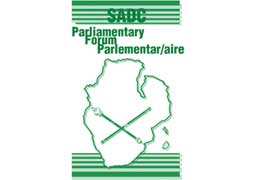
The Southern African Development Parliamentary Forum (SADC-PF) met recently with traditional leaders and religious sector representatives as part of the ongoing consultations on the SADC Model Law on gender-based violence (GBV). The objective of the Model Law is to guide SADC member states in developing effective policies and legislation to tackle GBV in the SADC region.
The SADC-PF Secretary-General Ms Boemo Sekgoma said this model law brings international best practices on GBV legislation to the SADC region, customised for the SADC context. “Your input as religious and traditional leaders is necessary to strengthen the social fabric of the SADC region. I believe you will concur with me to find that the legal provisions concerning GBV are mostly in harmony with religious and traditional values. Where there are discrepancies, we will be open to discuss about them and we indeed require your immense wisdom and on-the-field experience to rationalise provisions in view of the finalisation of the SADC Model Law,” said Ms Sekgoma.
She also emphasised that the model law is in no way meant to undermine any cultural or religious customs, and is premised on the human rights to physical integrity, health, life and the protection of the individual from torture and inhuman and degrading treatment. “The mainstay of the Model Law consists of an unflinching compliance with human rights that are generally accepted internationally in global instruments as well as in the African Charter on Human and Peoples’ Rights,” she said.
Presenting on behalf of the legal drafter of the model law, Ms Clare Musonda said the model law is not a treaty, and therefore it does not require signature from member states. However, it will be distributed for member states to draw upon to fill any existing gaps in their domestic legislation.
The Vice-President of Traditional Affairs in Africa, King Ndimu from the Democratic Republic of Congo, questioned the conflict between African culture and international law, saying that African culture is often undermined by the West. “The West is denigrating our culture. We have to listen to our traditional laws and not recognised ourselves through the lens of international law. International law should be compatible to our own laws, not the other way round. Each and every country in the continent must value African culture.”
Ms Sekgoma acknowledged the conflict but said reconciliation is possible. “International law is based on equality, while culture often privileges men and treats them as more superior than women. Through this Model Law we can achieve equality between men and women,” she said.
The SADC-PF also cautioned the traditional and religious sector to refrain from using culture or religious practices to justify gender inequality and GBV. Princess Mihanta Ramanantsoa from Madagascar commended the Model Law for being “rightly neutral when it comes to gender violence”, saying that GBV was not only about women and children.
“Most of us think GBV is only men abusing women, but men are also victims of violence; it is a societal problem. We are ready to work with SADC to implement the model law so that our communities may enjoy their human rights,” said Princess Ramanantsoa.
Professor Ezra Chitando from the World Council of Churches, Southern Africa region, commended the SADC-PF for recognising the strategic role of religious and traditional leaders in the development and implementation of the model law. “According to the Afrobarometer Dispatch 339 of 2020, Africans trust their religious and traditional leaders more than any other leaders. We are on the frontline responding to cases of GBV when they happen, as well as seeking to provide counselling to prevent them from happening.”
Prof Chitando also pledged the religious sector’s commitment to fight for the promotion gender equality, to reduce gender discrimination and prevent gender abuses and acts of violence related to gender.
Sakhile Mokoena
27 September 2021

